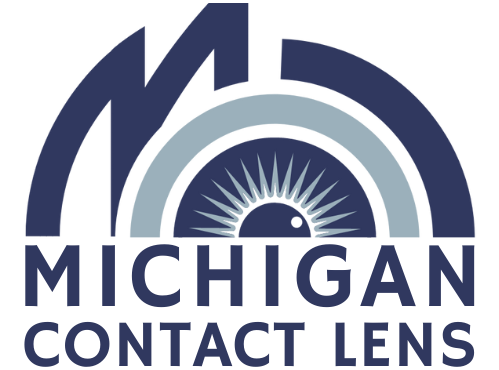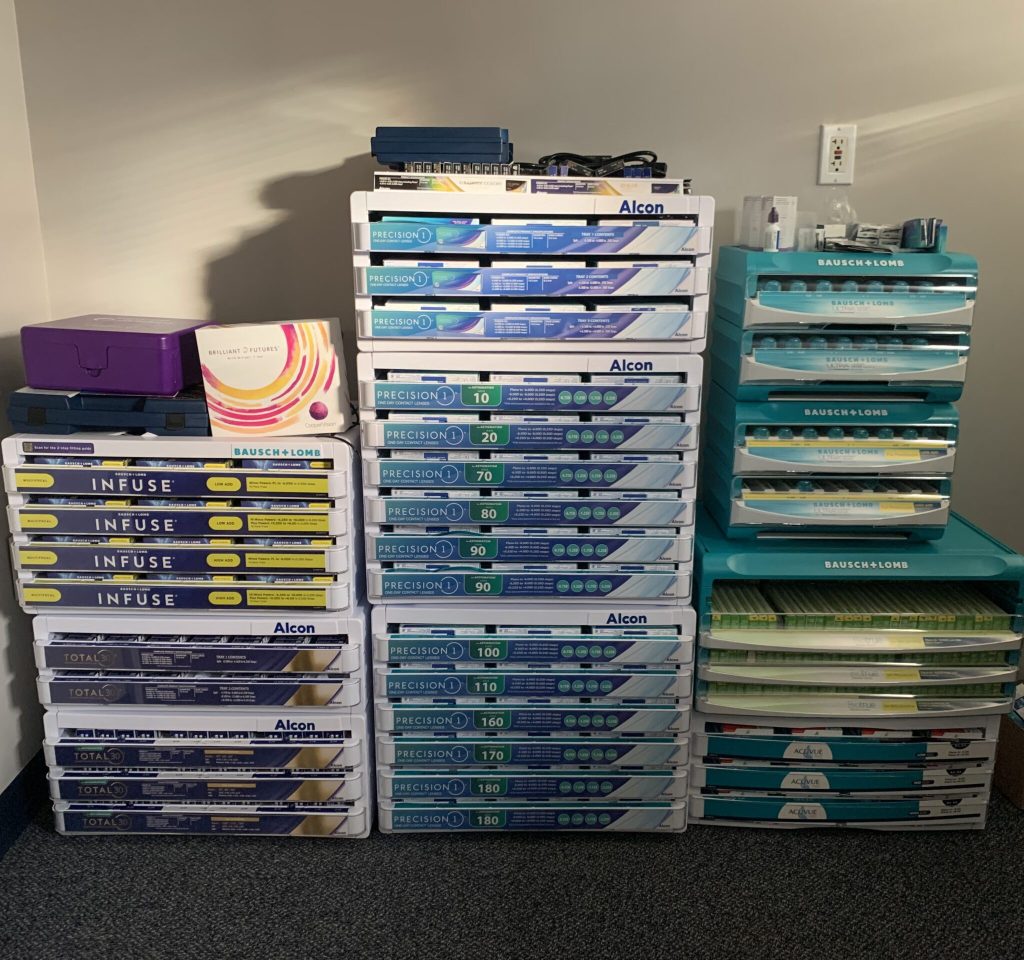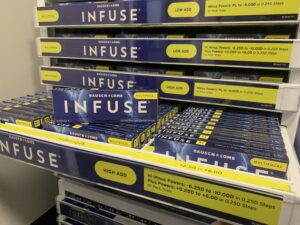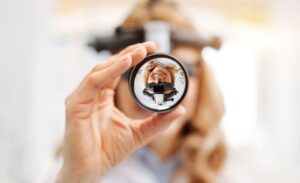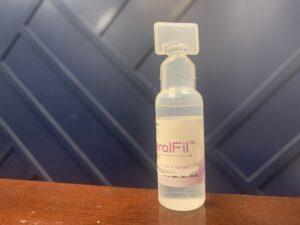$149 Contact Lens Exam By a Specialist
Get the right contact lens prescription the first time with our contact lens specialist. Every patient gets an immersive exam including a topography and more free trials than you can handle!
All you need to know about your Eye Exam for Contact Lenses in Michigan
A contact lens exam, also known as a contact lens fitting, is a comprehensive evaluation of your eyes and vision to determine the best type of contact lenses for your individual needs. During the exam, our optometrist in Michigan will measure the size and shape of your eyes, assess your vision, and evaluate the health of your eyes.
The main purpose of a contact lens eye exam is to ensure that the contact lenses you wear are safe and comfortable. Your local optometrist will make sure that your contact lenses fit properly, that they do not cause any damage to your eyes, and that they provide the best possible vision correction. A contact lens exam is also an opportunity for your optometrist to educate you on how to properly care for your contact lenses and what to do if you experience any problems while wearing them.
Why is a contact lens exam and fitting necessary?
There are several important reasons why a contact lens exam is necessary.
- Eye Health: Contact lenses are medical devices that are placed directly on the surface of your eyes. A contact lens exam will help ensure that your eyes are healthy enough to wear contact lenses and that the lenses do not cause any damage or harm to your eyes.
- Proper Fit: The size and shape of your eyes play a crucial role in determining the best type of contact lenses for your individual needs. A contact lens exam will help ensure that your lenses fit properly and that you are wearing the correct size and type of lenses for your eyes.
- Vision Correction: Your optometrist will assess your vision and determine the best type of contact lenses to correct your specific vision problems. They will also make sure that your lenses provide the best possible vision correction and that you are able to see clearly with your contact lenses.
- Comfort: Comfort is an important factor in determining the success of contact lens wear. A contact lens exam will help ensure that your lenses are comfortable and that you do not experience any discomfort or irritation while wearing them.
- Maintenance and Care: A contact lens exam is also an opportunity for your optometrist to educate you on how to properly care for your contact lenses and what to do if you experience any problems while wearing them. They will also provide you with instructions on how to properly clean and maintain your lenses, which will help prolong their lifespan and keep your eyes healthy.
How is a contact lens exam and fitting performed?
A contact lens exam typically involves several steps and usually takes about 30 minutes to an hour to complete.
- Medical History: The optometrist will start by asking you questions about your medical history and any previous eye problems you may have had. They will also ask about any current medications you are taking and any allergies you may have.
- Visual Acuity Test: This is a standard test to measure your vision without the use of contact lenses. The optometrist will ask you to read letters on a chart while they measure the sharpness of your vision.
- Refraction Test: This test measures the way your eyes focus light. Your optometrist will ask you to look through a machine called a phoropter, which contains different lenses. They will then ask you to rate the clarity of your vision for each lens until they determine the prescription that provides the best vision correction for you.
- Keratometry: This test measures the curvature of the cornea, which is the clear outer layer of your eye. The optometrist will use a keratometer to measure the curvature of your cornea and determine the best type of contact lenses for your individual needs.
- Pupil Dilation: Your optometrist may dilate your pupils with special eye drops to examine the health of the inside of your eyes. This will allow them to see any potential problems, such as cataracts, glaucoma, or age-related macular degeneration.
- Contact Lens Fitting: Once your optometrist has assessed your eyes and vision, they will select the best type of contact lenses for your individual needs. They will then place a trial pair of contact lenses on your eyes and evaluate the fit and comfort of the lenses.
- Instructions and Care: Your optometrist will provide you with instructions on how to properly insert, remove, and care for your contact lenses. They will also provide you with a follow-up appointment to check the fit and make any necessary adjustments. Additionally, they will also educate you on the different types of cleaning and disinfecting solutions available, and the best way to use them.
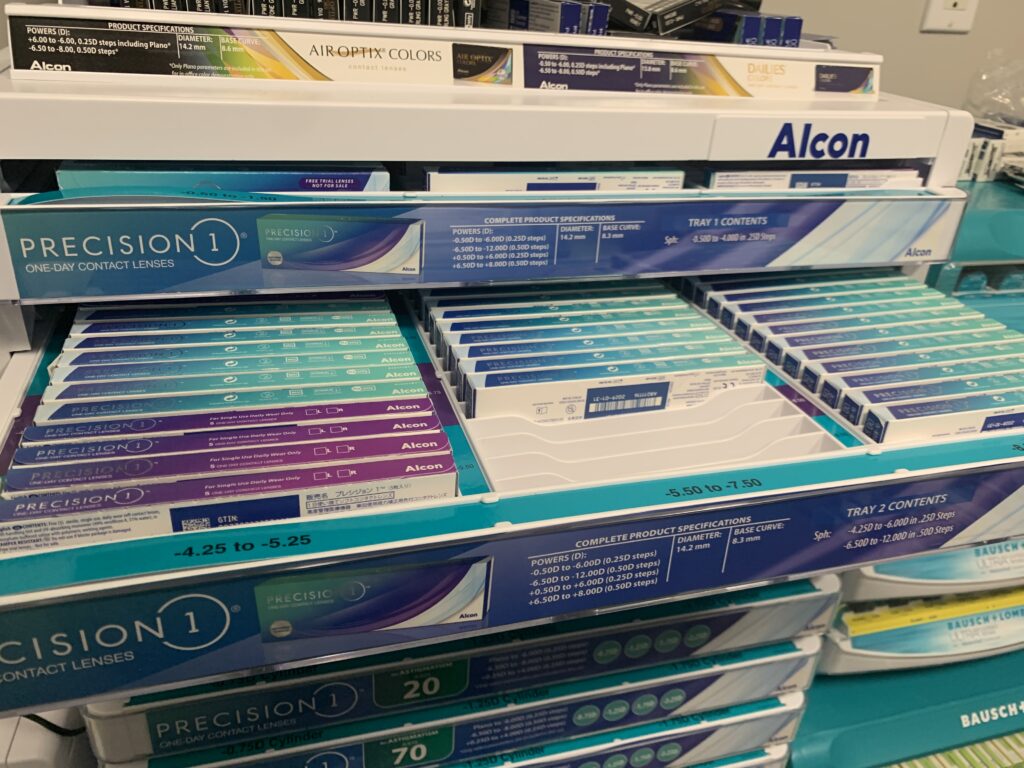
How long does a contact lens fitting and exam take?
A contact lens exam is an important appointment for anyone who wears or is interested in wearing contact lenses. It is a comprehensive evaluation of your eyes, vision, and the suitability of contact lenses for you. The length of the exam can vary, but on average it takes about 30 minutes to an hour to complete.
The contact lens exam starts with a review of your medical history and current medications. This is followed by a visual acuity test, which measures your sharpness of vision without the use of contact lenses. This is usually done using a standardized eye chart.
Next, the optometrist will perform a refraction test to determine your prescription for contact lenses or glasses. This test measures the way your eyes focus light and involves looking through a machine called a phoropter, which contains different lenses. The optometrist will ask you to rate the clarity of your vision for each lens until they determine the best prescription for you.
After the refraction test, the optometrist will perform a keratometry test to measure the curvature of your cornea. This information is used to determine the best type of contact lenses for your eyes. The optometrist may also dilate your pupils with special eye drops to examine the health of the inside of your eyes.
Once the necessary tests are completed, the optometrist will perform a contact lens fitting. This involves selecting the best type of contact lenses for your individual needs and placing a trial pair of contact lenses on your eyes. They will then evaluate the fit and comfort of the lenses and make any necessary adjustments.
Finally, Dr. Kresch, a top contact lens optometrist in Michigan, will provide you with instructions on how to properly insert, remove, and care for your contact lenses. They will also schedule a follow-up appointment to check the fit and make any necessary adjustments.
What Should I Bring to My Contact Lens Exam?
When you attend your contact lens exam, it is important to bring the following items:
- Your current glasses or contact lens prescription (if you have one): This information is important because it can give your optometrist a baseline of your vision and any vision correction you may need. If you have an old prescription, it is still useful to bring it, as it can provide valuable information about your eye health history.
- A list of any medications you are currently taking: Some medications can affect your eyes and how well you can see, so it is important to provide this information to your optometrist. They will be able to determine if any medication may interfere with the proper fitting of your contact lenses.
- Any relevant medical history, such as allergies or previous eye problems: If you have a history of allergies or eye problems, your optometrist will need to know this information to determine the best type of contact lenses for you. Allergies or previous eye problems can also affect the health of your eyes and the comfort of your contact lenses.
- Payment for the exam fee: Contact lens exams usually require a fee, so it is important to bring the necessary payment to cover the cost of the exam.
- A driver’s license or government-issued ID for verification purposes: This is for identification purposes and helps to ensure that your optometrist has the correct information about you.
How Often Do I Need to Have a Contact Lens Exam?
The frequency of your contact lens exams will depend on your individual needs and the type of contact lenses you wear. As a general rule, it is recommended that you have a contact lens exam at least once a year. This is to ensure that your contact lenses are still fitting properly and that your vision prescription has not changed. Additionally, regular eye exams can detect any changes in your eye health that may affect your ability to wear contact lenses. If you have any concerns about your eyes or contact lenses, you should schedule an appointment with your optometrist.
Will the Exam be Painful or Uncomfortable?
The contact lens exam is usually not painful or uncomfortable. The optometrist may use special eye drops to dilate your pupils, which can cause a temporary burning or stinging sensation. However, this should subside quickly. The contact lens fitting may feel a little strange at first, but the optometrist will ensure that the lenses fit properly and are comfortable to wear. If at any time during the exam you feel pain or discomfort, it is important to let your optometrist know so they can make any necessary adjustments.
What Types of Contact Lenses Will Be Discussed During the Exam?
During the exam, your optometrist will discuss the different types of contact lenses that are available, including soft contact lenses, gas permeable contact lenses, and extended wear contact lenses. They will also discuss the different types of lenses available for specific vision problems, such as astigmatism and presbyopia. Your optometrist will take into consideration your individual needs, such as your lifestyle and vision correction needs, to determine the best type of contact lenses for you.
How Will My Prescription for Contact Lenses be Determined?
Dr. Kresch will perform a refraction test to determine your prescription for contact lenses. This test measures the way your eyes focus light and involves looking through a machine called a phoropter, which contains different lenses. The optometrist will ask you to rate the clarity of your vision for each lens until they determine the best prescription for you. This prescription will be used to order your contact lenses and ensure that they provide the correct amount of correction for your vision. In addition to the refraction test, the optometrist may also perform other tests such as a visual acuity test, a keratometry test, and a pupil dilation to get a full understanding of your eye health and visual needs. The combination of these tests will allow the optometrist to create a customized prescription that will provide you with the best possible vision correction and comfort when wearing contact lenses.
Can I Wear Contacts the Same Day as My Exam?
In most cases, you can wear contacts the same day as your exam, but it is always best to check with your optometrist. They will be able to give you a better idea of when you can start wearing your contacts based on your specific eye health and prescription. If there are any concerns or issues with your eyes, your optometrist may recommend that you wait a certain amount of time before wearing your contacts. It’s important to follow their advice to ensure that your eyes remain healthy and comfortable.
How The Michigan Contact Lens Specialists Can Help
A contact lens exam is an important appointment for anyone who is interested in wearing contacts. By coming prepared with all the necessary information and asking any questions you may have, you can get the most out of your exam and ensure that you have a healthy and comfortable experience with your contact lenses.
